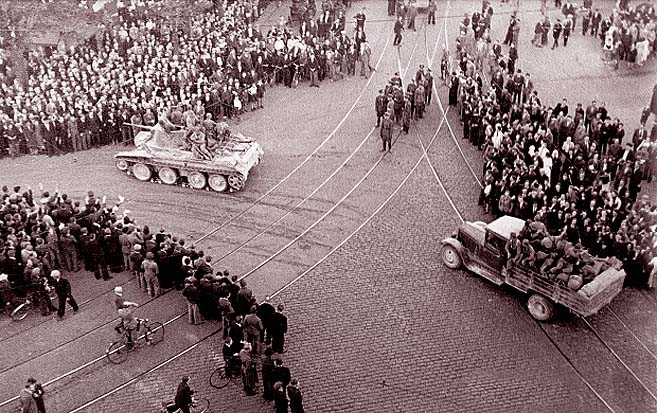
Russian MFA Defends Soviet Annexation of Baltic States and Moscow
Publication: Eurasia Daily Monitor Volume: 8 Issue: 221
By:

On December 1 and 2, respectively, Lithuania’s and Estonia’s ministries of foreign affairs (MFAs) refuted the Russian MFA’s latest claims that the three Baltic States (Estonia, Latvia, and Lithuania) had voluntarily joined the Soviet Union in 1940.
Moscow’s claims in this regard are hardly new; but are being resurrected in the context of Russian-fanned tensions with the US and NATO over European security, and are presented with some new twists to the old arguments. In a radical historical innovation, Russia’s MFA statement further claims that the present-day Republic of Moldova is a Russian land (see below).
Lithuania and Estonia chose to reply in a low key. Lithuania’s MFA handed over a note to the Russian embassy in Vilnius, expressing regret that “some senior diplomats in Russia’s MFA continue to operate in last century’s spirit of falsification of history.” Estonia’s Foreign Minister, Urmas Paet, made a personal statement, dismissing Moscow’s claims as “nonsense” [yerunda] and for “sticking to positions unchanged from Soviet times.” Tallinn will not issue a diplomatic note (BNS, Interfax, December 1, 2).
Superficially, the timing of all these statements seems puzzling. Moscow has re-activated the polemic over history unexpectedly, after a few years of relative restraint on this score. For their part, Vilnius and Tallinn took two weeks to respond, as cautiously as they did. The key word, “occupation,” does not figure in the texts as released to the public. There are no reactions on record from the other countries targeted by the Russian MFA’s statement.
Moscow released the statement on November 17, sourcing it to the ministry’s historical section as an official interpretation of history. It justifies the entry of Soviet forces on the territories of the three Baltic States in 1939-40 as a military necessity. It argues that the move strengthened the Soviet Union’s defenses and prevented the use of the Baltic States as anti-Soviet outposts. It implies that the military intervention punished the Baltic States for their “anti-Soviet policy” and for failing to heed Moscow’s warnings to correct that behavior. Ultimately, “political forces loyal to the USSR came to power” in the Baltic States in July 1940, and “requested that their three states be incorporated into the Soviet Union.” In August that year, Moscow “satisfied their requests.”
The document goes on to state that the Soviet Union recovered Bessarabia and northern Bukovina in 1940 by presenting an ultimatum to Romania. It argues that this move (like that in the Baltics) also prevented Romania from functioning as an anti-Soviet “forward base.” The document describes Bessarabia (i.e., the Republic of Moldova’s heartland between the Nistru and Prut rivers, not Transnistria) as “primordial Russian land,” “ancient Russian land” (“iskonno russkaya zemlya,” “drevnerusskaya zemlya,” using the word Russian in its ethnic sense).
This claim coincides with the re-start of negotiations on the Transnistria conflict. It reflects Moscow’s sense of entitlement to influence over Moldova as such, not just Transnistria. Presumably aware of the implications, Moldova’s government has nevertheless shied away from responding. Ironically, Moscow’s June 26, 1940 ultimatum had erroneously described Bessarabia as majority-Ukrainian populated; whereas in the new version just released, Kyiv must find even northern Bukovina (which is actually Ukrainian-majority populated) being lumped with the “Russian lands” alongside Bessarabia.
The document openly acknowledges the 1939 Nazi-Soviet pact, its secret protocol on the partition of spheres of interest, and the subsequent Nazi-Soviet cooperation through 1941. With equal frankness it acknowledges “the obvious moral and political damage to the Soviet Union” from these actions. However, it goes on to argue that the price was worth paying for the military advantages gained. Thus, “pragmatism prevailed over any hesitations of an ideological or moral-political nature.”
Directly or indirectly, Moscow’s document conveys some “lessons of history” for Russia, the countries concerned, and their allies farther afield. First, that Russia considers itself entitled to take “preventive” military measures against smaller neighboring countries, on the excuse that these are somebody else’s “outposts.” Second, the countries that fail to heed Russian warnings, and turn into “forward bases,” risk Russian retaliation. Third, that Moscow accepts the moral and political liabilities attached to the use or threat of force, “pragmatically” calculating that strategic goals outweigh image liabilities in importance.
Such “lessons of history” seem relevant to Moscow’s current occupation of Georgian and Moldovan territories, repudiation of conventional arms control, gratuitous missile deployment in Kaliningrad region, long-term military base extensions in Ukraine and Armenia, and proposals to create a mechanism for Russian military intervention via the Collective Security Treaty Organization.
For the better part of two decades, Russian diplomacy claimed that the Baltic States had joined the Soviet Union voluntarily. The Baltic governments’ responses were always self-confident and spirited. In this latest case, however, Baltic reactions and those from Chisinau and Bucharest range from the cautious to the silent. Moscow can read this change as an encouragement to continue with such “lessons of history.”




